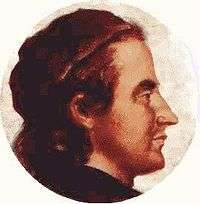Philipp Matthäus Hahn

Philipp Matthäus Hahn (November 25, 1739 in Scharnhausen, today part of Ostfildern – May 2, 1790 in Echterdingen, today part of Leinfelden-Echterdingen) was a German pastor, astronomer and inventor.
In about 1763 he devised a precision sundial, or heliochronometer that incorporated the correction for the equation of time.[1]
In 1773 he designed one of the earliest mechanical calculators of which two are known to have survived to the present day. A renowned clockmaker, several horological museums display his works, including the Deutsches Uhrenmuseum which contains a mechanical orrery (planetarium) and a Weltmaschine by the "Priestermechaniker (priest mechanic)".
Philipp Matthäus Hahn's influence upon Friedrich Schiller's Ode to Joy
According to Reinhard Breymayer's statement Friedrich Schiller's verses "Brüder - überm Sternenzelt/ muß ein lieber Vater wohnen" ("Brothers, above the starry canopy/ There must dwell a loving Father") reflecting the poet's Philosophy of Love are a reference to the astronomer and pastor Hahn's Theology of Love.[2]
References
- ↑ Christopher St. J.H. Daniel (4 March 2008). Sundials. Osprey Publishing. pp. 47–. ISBN 978-0-7478-0558-8. Retrieved 25 March 2013.
- ↑ Cf. Reinhard Breymayer: Erhard Weigels Schüler Detlev Clüver und sein Einfluss auf Friedrich Christoph Oetinger (1702–1782) […] In: Katharina Habermann, Klaus-Dieter Herbst (Ed.): Erhard Weigel (1625–1699) und seine Schüler. Universitätsverlag Göttingen, Göttingen 2016, pp. 269–323, here pp. 317–322: Nachweis einer Verbindung zwischen dem mit Mozart und Beethoven vertrauten Franz Joseph Reichsgraf von Thun und Hohenstein, dem Mechaniker Philipp Gottfried Schaudt und dem Pfarrer Philipp Matthäus Hahn. Findet sich eine Spur von Hahns Theologie in Schillers Ode "An die Freude"? – Count Thun in Vienna was a nephew of Josef Friedrich Wilhelm, prince of Hohenzollern-Hechingen in Hechingen near Onstmettingen. Both ordered an astronomic machine constructed in Onstmettingen by Onstmettingen's pastor Hahn and produced by Onstmettingen's head teacher Schaudt. Count Thun's wife, Maria Wilhelmina Reichsgräfin von Thun und Hohenstein née Comtessin von Uhlfeld, is remembered as the sponsor of a musically and intellectually outstanding salon in Vienna and for her patronage of music, notably that of Mozart and Beethoven.
Bibliography
Primary sources
- Philipp Matthäus Hahn: Kurze Beschreibung einer kleinen beweglichen Welt-Maschine.Faksimile-Neudruck der wiederentdeckten Ausgabe Konstanz, Lüdolph, 1770. Herausgegeben von Reinhard Breymayer. Mit einem Geleitwort von Alfred Munz. Tübingen : Noûs-Verlag Thomas Leon Heck, 1988. [About the astronomic machine ordered by Josef Friedrich Wilhelm, Prince of Hohenzollern-Hechingen.]
- Philipp Matthäus Hahn [Author] – Jakob Friedrich Klemm [Adjoint author]: Etwas zum Verstand des Königreichs Gottes und Christi ("Fingerzeig") * samt einem Auszug aus dem "Theologischen Notizbuch" von Philipp Matthäus Hahn mit neun ausgewählten Abhandlungen aus dem zeitlichen Umfeld der Epheserbriefauslegung von 1774. Herausgegeben von Walter Stäbler. (Stuttgart : Verein für württembergische Kirchengeschichte c/o Landeskirchliches Archiv Stuttgart), 2016 (Kleine Schriften des Vereins für württembergische Kirchengeschichte, Nr. 20). [Redaction: Reinhard Breymayer.] – ISBN 978-3-944051-11-6.
- Philipp Matthäus Hahn: Hinterlassene Schriften. Hrsg. von Christoph Ulrich Hahn. Heilbronn [am Neckar]/Rothenburg ob der Tauber, 1828.
Secondary sources
- Walter Stäbler: Pietistische Theologie im Verhör. Das System Philipp Matthäus Hahns und seine Beanstandung durch das württembergische Konsistorium. Stuttgart: Calwer Verlag, 1992. – Ev.-Theol. Diss. Münster in Westfalen 1990. ISBN 3-7668-3130-5
- Philipp Matthäus Hahn 1739–1790. Pfarrer, Astronom, Ingenieur, Unternehmer. Teil 1: Katalog; Teil 2: Aufsätze. Stuttgart : Württembergisches Landesmuseum Stuttgart, 1989.
- Reinhard Breymayer: "Anfangs glaubte ich die Bengelische [d. i. von Johann Albrecht Bengel stammende] Erklärung ganz ..." Philipp Matthäus Hahns Weg zu seinem wiederentdeckten "Versuch einer neuen Erklärung der Offenbarung Johannis" <1785>. In: Pietismus und Neuzeit. Ein Jahrbuch zur Geschichte des neueren Protestantismus. Im Auftrag der Historischen Kommission zur Erforschung des Pietismus herausgegeben von Martin Brecht, Friedrich de Boor, Klaus Deppermann, Ulrich Gäbler, Hartmut Lehmann und Johannes [Christian] Wallmann, Band 15 (1989). Schwerpunkt: Die Gemeinschaftsbewegung. Göttingen (1989), pp. 172–219.
- Günther Schweizer: Familie, Vorfahren und Verwandte von Philipp Matthäus Hahn. Pfarrer, Astronom, Ingenieur und Unternehmer. 1739-1790. Herausgegeben vom Förderverein Stadtmuseum Leinfelden-Echterdingen e. V. (Tübingen: Prof. Dr. Günther Schweizer, 2006.) (Schriftenreihe des Fördervereins Stadtmuseum Leinfelden-Echterdingen e. V., Band 2). ISBN 3-00-020221-8.
External links
- A Brief History of Mechanical Calculators
- Jim Falk, Things that Count. Part 2, "The emergence of the modern calculator"